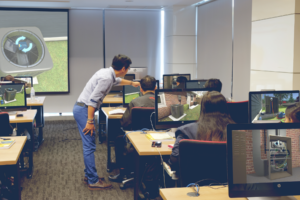Leading Edge Certification

By Tom Vander Ark & Susan Patrick
The system of education certification is badly out of date and benefits schools of education more than K-12 schools. The rise of blended and online learning has accelerated the obsolescence of traditional employment barriers. Forward leaning policy design efforts like Digital Learning Now! (DLN) recommend performance based certification that rewards demonstrated effectiveness. DLN also recommends professional development opportunities for online and blended learning teachers.
Because most colleges of education are not preparing teachers or administrators to teach or lead in technology enriched classrooms, the Leading Edge Certification was developed by California educators.
iNACOL helped CUE get started with the online/blended teacher certification, which was the first certification they developed. Dr. Allison Powell, Vice President of State and District Services, was on the committee to provide feedback and guidance on the iNACOL Quality Teaching Standards and what skills online teachers needed. As the field has grown, they started to develop a second certification for the blended teacher, but from feedback they received, combined the two certifications. The first group went through the combined certification in the fall.
The alliance of nonprofits, universities and educational agencies formed in 2010 focused on expanding the certification in California with aspirations of adding a more national partners to grow the program and the value of becoming Leading Edge Certified.
There are five areas of certification:
- Online and Blended Teacher
- Administrator
- Digital Educator (available in July, 2013)
- Teacher Librarian (available in July, 2014)
- Leading Educator (Professional Developer)
The online/blended teacher certification is the one iNACOL has been involved in. Its covers all of the iNACOL standards and is very engaging and project based so teachers can take what they have created and use it in their online and blended classrooms.
Over 500 online and blended teacher certifications have been issued. In San Diego County, business partners scholarship the cost of the program.
The content is open and available for anyone to take and use however they wish, but a “certified” trainer must teach the class in order for the participants to become a part of the community and to become certified. Groups may join the advisory group by paying a fee or donating time/resources, which allows them to provide feedback and input into each certification.







gpouliot
"In San Diego County, business partners scholarship the cost of the program."
Does this sentence make sense to anyone else?